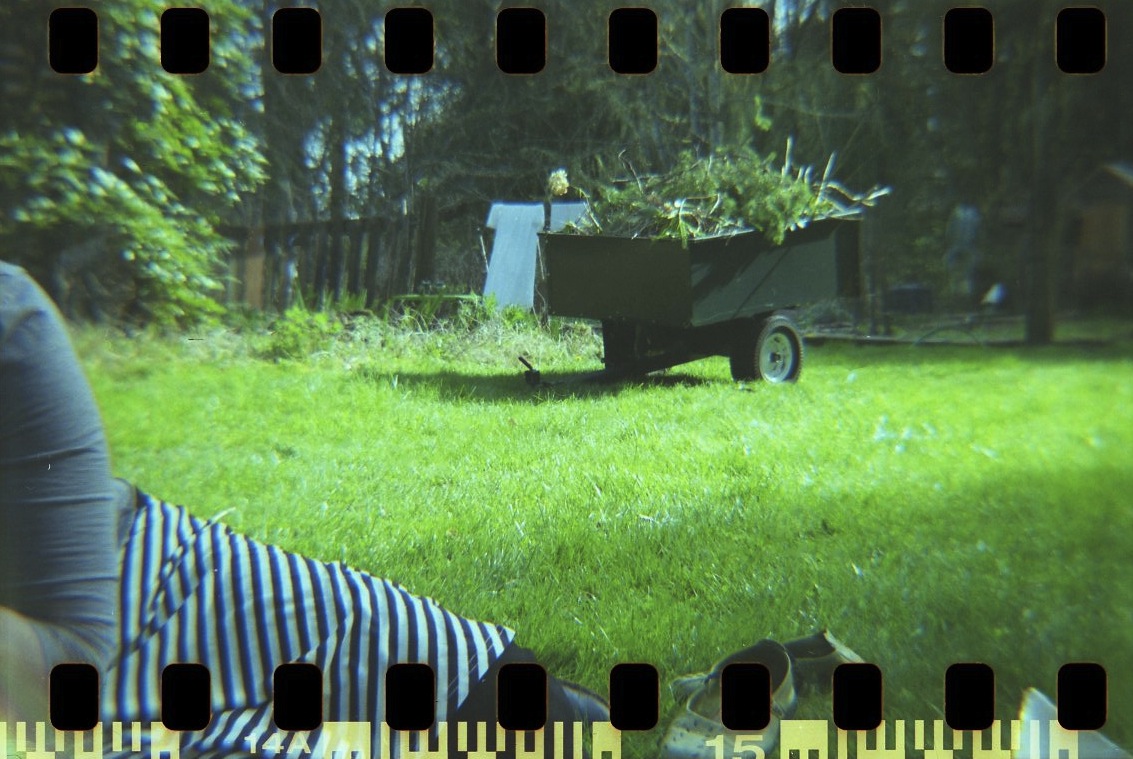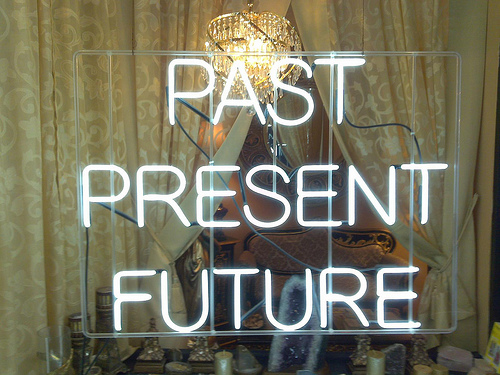Finding a Story's Heart (In The Word Cellar)
 Wednesday, May 26, 2010 at 2:08PM
Wednesday, May 26, 2010 at 2:08PM  in the clearing, Frog Creek Lodge, Lakebay, WA; spring 2010 (Diana+, Kodak GC400)
in the clearing, Frog Creek Lodge, Lakebay, WA; spring 2010 (Diana+, Kodak GC400)
Essays are the Dianas of the writing world.
When you write creative nonfiction (such as blog posts and essays), are you trying to record the facts of what happened or to capture the essence of the experience? Unless you work as an investigative reporter or a journalist, you probably seek to capture the essence of people, places, and events in your writing. You seek to tell a story.
Great nonfiction doesn't just tell us what happened. It creates art from real life.
There's the scene at hand, and then there's the story.
I used to try to take pictures that captured the whole scene and encapsulated every little true-to-life detail. But those photos bored me; they had no story. Playing with my analogue Diana F+ camera has started to change that. Plastic cameras like the Diana are known for creating photos with a vignette effect -- the way an image fades, blurs, and shades around the edges. Vignette is also the word for a short, descriptive story.
But you don't need a plastic film camera to take great story-shots. And you don't need to write short vignettes to create a story with heart. Digital or analogue. Blog post or long form essay. They're all about framing an object subjectively; about finding the light and shadows; about contours and composition. Art isn't just about capturing what happened. It's about making sense of what happened. Art is about making connections between one thing and another and then another. I'm drawn to stories (visual and written) that do more than simply record a scene. I want stories that offer a new perspective, stories that capture the emotion, essence, and meaning of a moment.
How do you write beyond the events and into the heart of the story?
In elementary school, I went through a phase of telling the truth -- the whole of it and nothing but it. I appointed myself guardian of just the facts, ma'am. If my mom and I ran errands, going first to the bank and then to the bakery, and she later told my dad that we'd gone to the bakery and the bank, I corrected her. She had the order wrong, which meant she wasn't telling the real story.
Ah yes, the real story. Earlier this month we looked at finding our true writing voice. I said that while there is such a thing as an authentic writing voice, it's also a living thing that evolves and can splinter into different (but equally authentic) voices. Turns out that the real story is another slippery entity.
A few months ago my friend Vivienne (who, incidentally, takes gorgeous photographs bursting with stories) and I talked about how to write beyond events and into what really happened. In other words, how to find a story's heart. This topic could consume us for weeks (and maybe it will), but here's a primer on what I know about getting to the heart of things.
- Stories need meaning, not morals. (This is some of the wisest writing advice my pal Jen Lee has given me.) Give your readers enough meat of the story and its implications to help them understand why the story matters. Don't turn a story into a Sunday School lesson. Nobody likes a moralizing know-it-all. (Trust me, I know; I've been one.) Trust your readers, but don't make them do the creative equivalent of quantum physics to understand what the story means.
- Stories need details. But not too many. And only the important ones. How do you tell how many and which details to include? It's different for every writer and for every piece of writing, but there are a few things to keep in mind. Details should create texture and interest within a story. They should focus the readers' attention on what matters. They should add to the artfulness of the scene you're writing. Frame your paragraphs as you would frame a photograph. Use spectacular and specific details to draw in readers and immerse them in the world you're recreating. Don't try to capture the whole world, even when you're writing true stories. Be selective.
- Stories need a bridge between the personal and the universal. Even when you're telling an intimate story about a unique experience, readers should find something in it to relate to as fellow humans. But beware of moralizing here! Don't build a literal bridge that points out the obvious or talks down to the reader. Oddly enough, the more specific your details, the more universal your story can become. This is one of those things (like so much) about writing that I see and feel intuitively. I'm working on figuring out a more concrete way to explain it. Until then, mull it over and let me know if you can verbalize it any better. (Please share in the comments if you take a stab at it.)
- Stories need a focus. The focus of a story drives the meaning, the details, and the bridge. I usually don't know a story's focus until I've written a large chunk of it. Only after sketching out and connecting ideas do I find a story's heart. I've rewritten essays five times before I found their real essence. A story can contain a lot of seemingly disparate elements, but you need to know how they tie together. If you don't know -- at least on some intuitive level -- your readers won't know.
- Stories need to be True. That's "Truth" with a capital "T." This may be the most important point of all. Your story needs to feel True on the page, in your mind, in the eyes of your readers. I've written things that are technically true by dutifully capturing my thoughts or the true-to-life details of a scene. But the scene fell flat and veered outside the heart of the story. Annie Dillard says it best in her "Notes for Young Writers": "The work's unity is more important than anything else about it. Those digressions that were so much fun to write must go." This is another one of those things that you learn by doing. The more you write, the easier it will be to decipher what's True, and to sacrifice anything that doesn't serve the story. (Try to get your hands on Dillard's short essay. It may be the best writing advice I've ever read. You can find it in Issue 15 of the literary journal Creative Nonfiction.)
I want to capture the whole world in my writing, but I can only do it one frame and one heartbeat at a time. Now it's your turn: How do you write into the heart of a story?
**Post your writing questions in the comments or send them to jennifer{at}thewordcellar{dot}com.
In The Word Cellar runs on the second and fourth Wednesday of the month. Read other posts in the series here.
 diana,
diana,  in the word cellar,
in the word cellar,  photography,
photography,  writing life,
writing life,  writing tips
writing tips 


